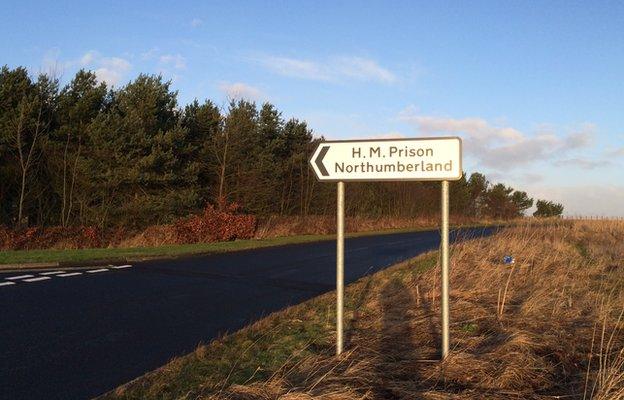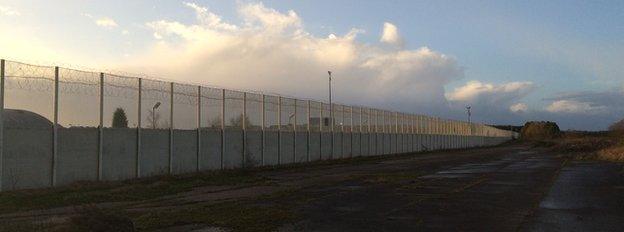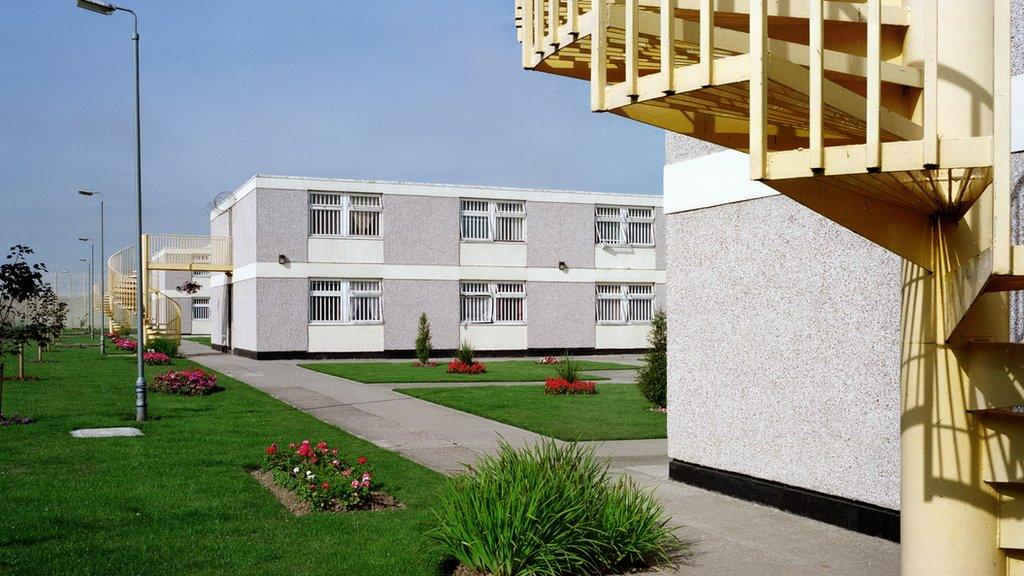HMP Northumberland: Inside the 'powder keg' prison
- Published

Sodexo Justice Services took over HMP Northumberland in December 2013
A report into HMP Northumberland has found safety at the prison has deteriorated in the past two years. BBC News was allowed to visit the prison, described by some as a "powder keg", to assess how bad things were.
A "very tough three years" was how outgoing director Matt Spencer describes his time at HMP Northumberland.
The category C prison has seen some major changes in his time at the helm and has come in for some serious criticism.
Following privatisation to French firm Sodexo just over a year ago - and losing more than a third of its staff - there have been a series of assaults and disturbances at the jail.
Last month a former officer at the prison told BBC News that, although violence had always gone on at the jail, it had increased since privatisation.
The chief inspector of prisons, Nick Hardwick, has repeatedly linked staff cuts across the system to a rise in violence and suicides, external.
But Mr Spencer, who has now left the prison, maintained this was not a factor at HMP Northumberland.
"All prisons have incidents, so we did have incidents before Sodexo won the contract," Mr Spencer said, sitting in his office over a cup of coffee with incoming director Tony Simpson.

Until 2011, the site was two separate prisons - a men's prison and a young offender's institution
"I think it's true to say that the number of incidents in almost all prisons up and down the country, public or private, have increased to some extent."
He said "resources" had been a factor in this, but insisted his jail had "appropriate" staffing levels and attributed some of the problems to the circulation of a drug called "spice".
Recently released figures, external showed discoveries of spice in prisons had spiralled in recent years, with the justice secretary indicating a link to increased violence.
Mr Spencer also argued people were now more aware of incidents that take place at the jail because of increased media scrutiny.
The inspection report released on Tuesday found the prison had a high number of violent incidents and prisoners felt unsafe.
There had been three suicides since the previous inspection in 2012, but inspectors said support for prisoners in crisis was good.

Spice - what is it?
Spice refers to a collection of herbs or plant material sprayed with synthetic chemicals to produce a cannabis-like effect when smoked
It was a legal high sold in headshops until 2009, when it was made a Class B drug like cannabis
Its intended effects are the same as cannabis, inducing relaxation or even euphoria, but it can cause dizziness, agitation or paranoia
Evidence suggests the chemicals used in it can be up to 10 times stronger than those found in cannabis
Source: Drugscope

Mr Spencer took over England's most northerly jail when it was two separate establishments, a category C men's prison and a young offender's institution.
This is evident from the sheer size of the site - about 4 sq miles (6.4 sq km) by Mr Spencer's reckoning. The old front gate to HMP Acklington, the former adult prison, is still visible in the middle of the grounds.
The one-time RAF airfield sits amid miles of Northumberland countryside, a challenge for visiting families of prisoners, some of whom come from more than 200 miles away.
Last year the Howard League for Penal Reform, external found officer numbers in public sector prisons had gone down by two fifths since 2010, a period of significant budget cuts to the Ministry of Justice.
Sodexo has had to review its staffing levels at HMP Northumberland and hired 27 new officers after the initial layoffs.

England's most northerly prison is surrounded by countryside
The atmosphere was relaxed in a wing for vulnerable inmates, where prisoners played pool and bantered with an experienced officer.
He said his approach was to establish a relationship with them. Those who passed him in the corridor spoke to him with respect.
However, the officer, who did not give his name, said he did not think the training regime for new staff was as good as that previously provided by the Prison Service.
The cells were reminiscent of university halls, relatively small but comfortable, and decorated with inmates' personal effects.
The guard said these cells, which had en suite bathrooms, were of a better standard than elsewhere on the site.
Another wing had a more classic prison look, with multiple balconies overlooking a central atrium, which had a mesh fixed across it to prevent people jumping.
A couple of new recruits were on duty in this block. One told BBC News it was his first job since leaving school.
Critics have said the new staff are inexperienced compared to those who left.
Mr Spencer said he was pleased with the new officers and that the average level of experience at the jail had only gone down slightly - from 18 years' service to 17.
He also argued improvements had been made. "One of the things that really appealed to the Ministry of Justice about the Sodexo bid for this prison was the working prisons element," he said.

The former RAF airfield covers roughly 4 sq miles (6.4 sq km)
In an old RAF hangar that is now the jail's engineering workshop, Mr Spencer explained how prisoners were making machine parts for Nissan's Sunderland plant - apparently a fruit of Sodexo's contacts in the Chambers of Commerce.
The busy textiles workshop now had twice as many prisoners working in it as a year ago, Mr Spencer said, with inmates across the jail working 40% more hours than before privatisation.
But the latest inspection report has found there is not enough purposeful activity at the jail and not enough activity places, with almost a third of prisoners locked up through the day.
It did, though, find there were "credible plans" to remedy this.
Mr Spencer's successor Mr Simpson has come from a maximum-security Sodexo prison in West Lothian, HMP Addiewell, which was purpose-built as a private prison and has not experienced the transitions HMP Northumberland has.
For him, one of the biggest challenges will be dealing with the scrutiny the prison has come under.
Mr Simpson said: "I totally respect the public's right to have an interest in what happens in prisons. I get that. I'm used to that."
But he described some of the language used as "unhelpful", arguing it affects people's confidence within the jail.
Sodexo said it welcomed the feedback from the report and that it had formed an action plan to address the issues raised.
Mr Simpson's next challenge will be to see through the necessary changes so that the next inspection will be more favourable.

HMP Northumberland is England's most northerly jail
- Published27 January 2015

- Published12 January 2015

- Published24 December 2014

- Published4 December 2014

- Published3 September 2014

- Published21 August 2014

- Published29 March 2014
